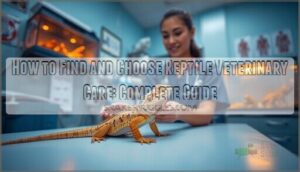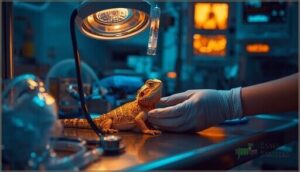This site is supported by our readers. We may earn a commission, at no cost to you, if you purchase through links.

Your bearded dragon hasn’t eaten in three weeks, her back legs won’t support her weight, and the general practice vet down the street just admitted they’ve never treated a reptile. This scenario plays out more often than it should, especially now that reptiles occupy 51 percent of all exotic pet households in the United States.
Unlike cats or dogs that share mammalian physiology with their veterinarians, reptiles require specialized knowledge of ectothermic metabolism, species-specific husbandry protocols, and diagnostic techniques that differ fundamentally from standard veterinary practice. Finding a qualified reptile veterinarian before an emergency strikes can mean the difference between reversible metabolic bone disease and permanent skeletal deformity, between a treatable respiratory infection and fatal organ failure.
The challenge isn’t just locating someone who will see your gecko or python—it’s identifying a practitioner with the training, equipment, and experience to deliver competent reptile veterinary care when your cold-blooded companion needs it most.
Table Of Contents
- Key Takeaways
- Why Reptile Veterinary Care Matters
- How to Find a Qualified Reptile Veterinarian
- What to Expect at a Reptile Vet Visit
- Preventive Care for Reptile Health
- Handling Emergencies and Advanced Care
- Frequently Asked Questions (FAQs)
- Where can I find a reptile vet?
- What is a reptile vet?
- Are there any good reptile vets?
- Do you need a reptile vet?
- What is a reptile vet Directory?
- Do small animal vets treat reptiles?
- How often should I take my reptile for checkups?
- Can all veterinarians treat reptiles and amphibians effectively?
- What are the most common reptile health problems?
- How do I choose the right veterinarian for reptiles?
- Conclusion
Key Takeaways
- Reptiles now occupy 51 percent of exotic pet households in the United States, yet most general practice veterinarians lack the specialized training in ectothermic metabolism and species-specific diagnostics needed to treat them effectively.
- Finding a qualified reptile veterinarian before emergencies arise prevents reversible conditions like metabolic bone disease from progressing to permanent skeletal deformity or organ failure, since reptiles instinctively hide illness until disease reaches severe stages.
- Annual wellness exams allow veterinarians to establish baseline blood values and detect hidden problems—internal parasites, early metabolic disorders, respiratory infections—months before visible symptoms appear, making preventive care far more effective than crisis intervention.
- Board-certified reptile specialists with documented caseloads in herpetology offer advanced diagnostics like CT imaging and species-appropriate anesthesia protocols that general practitioners typically can’t provide, so verifying credentials through veterinary association directories ensures your pet receives competent care.
Why Reptile Veterinary Care Matters
Reptiles aren’t just scaled versions of cats and dogs—they’ve completely different biological needs that most general veterinarians aren’t equipped to handle.
That’s why specialized reptile health check-ups focus on species-specific concerns like temperature regulation, UV exposure, and unique metabolic needs.
Without proper veterinary care suited to their species, your reptile can develop serious, often invisible health problems that progress quickly.
A consistent feeding schedule tailored to your reptile’s needs helps prevent digestive issues like regurgitation that can weaken their immune system over time.
Understanding why specialized care matters will help you make informed decisions that directly impact your pet’s quality of life and longevity.
Seeking out board-certified reptile veterinarians ensures your exotic pet receives accurate diagnostics from practitioners with proven advanced training.
Unique Health Needs of Reptiles
Reptiles don’t thrive on improvisation—their bodies work differently from cats or dogs, and small missteps in care can snowball into serious illness. Understanding these unique needs helps you partner with a reptile veterinarian who truly knows reptile medicine and surgery.
Reptiles demand precision, not guesswork—small care mistakes compound into serious illness without specialized veterinary expertise
- Reptile metabolism slows dramatically when temperatures drop, halting digestion and weakening immunity
- Temperature regulation depends on external heat sources, not internal thermostats like mammals use
- UVB lighting triggers vitamin D3 production in the skin, preventing devastating calcium deficiency and bone disease
- Species specificity means your bearded dragon needs completely different care than your ball python
- Professional veterinary care for reptiles tackles these distinct reptile health and wellness requirements with precision
To enhance reptile wellness at home, it’s essential to understand the basics of.
Risks of Neglecting Vet Care
Skipping routine veterinary care for reptiles sets the stage for hidden health issues that spiral quietly—metabolic bone disease, organ failure, or parasite loads build for months before you notice lethargy or poor shedding. Chronic pain management becomes complicated when respiratory infections or shell fractures go untreated, and malnutrition effects like fragile bones sneak up without weight checks. Reproductive complications, from egg binding to hormonal stress, demand emergency interventions that regular exams prevent. Neglecting routine vet visits puts pets at risk of preventable conditions with lasting harm.
| Neglect Area | Health Consequence |
|---|---|
| Skipped exams | Hidden metabolic or infectious diseases progress undetected |
| Poor nutrition tracking | Malnutrition effects: bone deformities, poor growth, organ damage |
| Delayed pain assessment | Chronic pain management failures; joint, shell, respiratory distress worsens |
| No reproductive monitoring | Reproductive complications: egg binding, tumors, fatal postpartum issues |
Trends in Reptile Ownership and Vet Demand
Growing reptile ownership reshapes your access to qualified exotic pet care—U.S. households with reptiles jumped from roughly 3.1 million in 2011 to over 6 million today, driven by younger urban owners who favor compact enclosures and social-media visibility. This 40-percent surge strains veterinary health infrastructure because exotic and reptile medicine remains a niche specialty, and workforce shortages limit timely appointments.
- Reptiles now represent 51 percent of all exotic pet households, making them the largest exotic pet category.
- Generation Z and millennials lead reptile adoption trends, seeking unique companions suited to apartment living.
- The exotic pet market reached 15.15 billion dollars in 2025, with reptiles and amphibians claiming 28 percent of that value.
- Veterinary services form the fastest-growing segment as pet humanization pushes demand for species-specific diagnostics and urban reptile care.
How to Find a Qualified Reptile Veterinarian
Finding the right veterinarian for your reptile isn’t the same as choosing one for a cat or dog. Not all veterinary practices have the specialized knowledge or equipment needed to properly diagnose and treat reptiles, so you’ll need to do some homework before your first visit.
Let’s look at how to identify a vet who’s truly qualified to care for your scaled companion.
Identifying Experienced Exotic Vets
You want a reptile vet who sees these animals weekly, not occasionally, because regular exotic pet care keeps clinical skills sharp and reptile medicine knowledge current. Ask how often the clinic treats species like bearded dragons or ball pythons, then check whether local herpetology groups and clinic reviews mention them.
An experienced reptile vet can also spot unusual snake behavior that signals health issues before they become serious emergencies.
The Association of Reptile and Amphibian Veterinarians maintains directories that highlight true reptile expertise and emergency handling capabilities.
Verifying Credentials and Facility Standards
Every practicing reptile vet must hold a current veterinary licensing from their state board, which you can verify through online public databases showing license status, issue date, and any disciplinary actions.
Board certification through organizations like the Association of Reptile and Amphibian Veterinarians signals specialized expertise. Check for facility accreditation standards, proper diagnostic equipment such as appropriate ultrasound probes, and biosecurity protocols that protect animal welfare during veterinary services.
What to Expect at a Reptile Vet Visit
Your first reptile veterinary visit sets the foundation for your pet’s long-term health, and knowing what happens during the appointment can help you prepare and feel more confident.
If you’re looking for specialized care in your area, you can find a qualified snake vet near you who understands these unique medical needs.
The veterinarian will perform a thorough physical examination, potentially recommend diagnostic testing based on your reptile’s species and health status, and discuss the husbandry factors that directly impact your pet’s wellbeing. Here’s what you can expect during a thorough reptile veterinary visit.
Initial Physical Examination Procedures
Your reptile vet will start by watching from a distance—evaluating posture and breathing, and movement before anyone touches your pet. This quiet observation reveals baseline behavior, since stress from restraint can hide subtle problems.
Next comes safe handling customized to species, followed by weighing, body condition scoring, and close inspection of skin, shell, eyes, mouth, and vent for signs of dehydration, infection, or retained shed.
Common Diagnostic Tests (Bloodwork, Fecal, X-rays)
Most vets recommend blood testing, fecal analysis, and X-ray imaging to build a complete picture of your reptile’s health.
Blood analysis evaluates organ function, calcium levels, and infection markers, while fecal testing detects parasites like coccidia or nematodes.
Radiographs reveal metabolic bone disease, retained eggs, or respiratory changes that physical examination alone might miss. Some clinics also offer reptile ultrasound or diagnostic endoscopy for complex cases.
Discussing Diet, Housing, and Behavior
Your vet will guide you through reptile nutrition and diet customized to your species, covering portion sizes, feeding schedules, and dietary supplements like calcium with vitamin D3.
You’ll discuss habitat design elements—temperature gradients, UVB exposure, substrate safety—and how environmental enrichment promotes behavioral health.
Addressing these factors together strengthens exotic pet health and helps you spot early warning signs of stress or illness.
Preventive Care for Reptile Health
Preventive care forms the foundation of keeping your reptile healthy for years to come, yet many owners don’t realize how much can be done before problems arise.
Your veterinarian becomes your partner in creating a care plan that covers nutrition, parasites, and long-term wellness through routine monitoring.
Let’s look at the key preventive measures that will help your reptile thrive.
Scheduling Regular Wellness Exams
Most reptile owners don’t realize their pet’s health can quietly decline for months before symptoms appear. That’s why establishing a wellness exam schedule is one of the most effective preventive measures you can take.
Your reptile vet will tailor exam frequency to your animal’s specific needs:
- Adult reptiles need annual checkups to maintain health baselines for future comparison.
- Young, growing animals require visits every 3 to 6 months to monitor skeletal development.
- Senior reptiles benefit from twice-yearly exams to screen for age-related organ dysfunction.
- Fast-metabolism species like chameleons often need semi-annual evaluations due to rapid health shifts.
- New acquisitions should receive veterinary care within 48 to 72 hours to detect transmissible diseases.
Regular wellness exams allow your veterinarian to identify metabolic bone disease through skeletal palpation before visible deformities occur, detect internal parasites through fecal analysis before weight loss starts, and reveal early stomatitis during oral cavity inspections. These visits also provide veterinary guidance on enclosure temperatures, UVB lighting schedules, and whether your current diet provides the correct calcium-to-phosphorus ratio for your reptile’s life stage. Establishing normal blood values through annual Complete Blood Counts creates a diagnostic reference point that proves invaluable when illness strikes, since reptiles often hide clinical signs until disease is severe.
Nutritional Counseling and Supplementation
Proper dietary planning forms the foundation of exotic pet health, yet most reptile nutrition and diet problems stem from well-meaning owners who don’t understand species-specific requirements. Your veterinarian will assess your reptile’s current feeding protocol, then provide targeted guidance on calcium balance, vitamin supplements, and feeder insects to prevent nutrient deficiencies before metabolic bone disease or hypovitaminosis develops.
| Supplement Type | Recommended Schedule |
|---|---|
| Plain calcium powder | Most feedings for reptiles with UVB |
| Calcium with vitamin D3 | Once or twice monthly as maintenance |
| Multivitamin powder | Weekly for insect-eating species |
Veterinary nutritional counseling tackles your reptile’s habitat and environment alongside diet, since UVB exposure directly affects how efficiently your pet absorbs calcium from food.
Parasite Control and Disease Prevention
Beyond nutrition, effective parasite control and disease prevention safeguard your reptile from internal worms, external mites, and zoonotic infections like Salmonella.
Veterinary guidance includes routine fecal exams to detect coccidia or roundworms before clinical signs appear, plus parasite testing one to two times yearly. Your vet will recommend:
- Quarantining new arrivals for 30 to 90 days
- Daily spot cleaning to reduce parasite eggs
- Disinfecting enclosures with diluted hydrogen peroxide
- Handwashing for 20 seconds after handling
This layered approach to reptile hygiene and infection control protects both your pet and your household.
Handling Emergencies and Advanced Care
Even with the best preventive care, reptiles sometimes face unexpected health crises that demand quick action and specialized intervention.
Knowing what warning signs to watch for, how to respond in those critical first moments, and what sophisticated treatment options exist can make the difference between recovery and tragedy. Let’s walk through the essential steps you’ll need to handle emergencies and understand the more complex care your reptile might require.
Recognizing Signs of Illness or Injury
Early illness detection demands careful health monitoring of your reptile’s daily patterns. Watch for changes in reptile behavior, such as prolonged hiding, appetite loss lasting beyond two feeding cycles, abnormal shedding, or labored breathing with mouth gaping.
Visible injury signs like limping, skin discoloration, sunken eyes, or neurologic symptoms warrant immediate veterinary guidance. Your reptile vet can provide animal medicine expertise for accurate reptile diagnostic evaluation and treatment.
Emergency Response Steps for Reptile Owners
When you spot distress, move your reptile into a quiet, dim room immediately to prevent collapse, then call an emergency vet or reptile vet for veterinary triage before you leave.
Crisis stabilization at home includes gentle supplemental heat for hypothermic animals, minimal handling to avoid shock, and keeping exposed tissues moist with sterile solution during reptile transport—owner preparedness with an emergency first aid kit ensures you’re ready for urgent care situations.
Specialized Treatments and Surgical Options
Once veterinary care moves beyond first aid, your reptile vet may recommend sophisticated treatments like coeliotomy surgery for internal masses, shell repair using orthopedic wire and composite materials, or wound care with hydrogels that reduce stress from frequent bandage changes. Reptile anesthesia using isoflurane at 2 to 5 percent keeps patients safe during procedures, while complex imaging such as CT scans guides intricate orthopedic work and helps plan surgical approaches with millimeter precision.
- Computed tomography reveals skull fractures and bone changes invisible on standard radiographs, shaping surgical decisions before your vet makes the first incision.
- Injectable alfaxalone at 10 to 20 milligrams per kilogram provides reliable immobilization when gas anesthesia isn’t available for your chelonian or lizard.
- Postoperative support includes strict temperature control, pain relief, and delayed feeding until normal gastrointestinal function returns in recovering reptiles.
Frequently Asked Questions (FAQs)
Where can I find a reptile vet?
You can locate reptile veterinarians through national veterinary association directories, specialty exotic pet clinics, local referrals from breeders or pet stores, online search filters for species-specific practices, and telemedicine platforms connecting remote specialists.
What is a reptile vet?
When your scaly companion needs help, a reptile vet becomes your lifeline—a veterinarian specializing in reptile medicine, exotic care, and herpetology, providing diagnostic services and treatment for snakes, lizards, turtles, and tortoises.
Are there any good reptile vets?
Yes, qualified reptile specialists do exist, though they aren’t as common as small-animal clinics.
Many exotic pet care practices now employ veterinarians with amphibian or reptile vet expertise, offering thorough reptile health services and diagnostic procedures.
Do you need a reptile vet?
Like a smoke alarm, you hope never sounds, a reptile vet becomes essential the moment your scaly companion shows subtle signs of illness—which, given their hardwired instinct to hide weakness, happens long before crisis strikes.
What is a reptile vet Directory?
A reptile vet directory organizes vet listings by location, allowing you to search for clinics with reptile and amphibian care expertise.
It also enables you to review vet credentials, read online reviews, and compare services before scheduling.
Do small animal vets treat reptiles?
Some do, but not all—many general small animal clinics treat common reptiles like bearded dragons or corn snakes when a vet has extra training in exotic pet services and reptile diagnostic procedures.
How often should I take my reptile for checkups?
Most reptile veterinarians recommend at least annual health examinations to monitor baseline health and catch problems early, though certain species or age groups benefit from checkups twice yearly for closer health monitoring.
Can all veterinarians treat reptiles and amphibians effectively?
Just as not every mechanic can rebuild a race car engine, not all veterinarians have the specialized reptile and amphibian medicine training needed to diagnose subtle species-specific problems or handle complex herpetology procedures effectively.
What are the most common reptile health problems?
Your pet may face metabolic issues, respiratory diseases, parasite control challenges, skin problems, or nutritional disorders.
These reptile health problems require veterinary care and proper diagnostic work to maintain animal health.
How do I choose the right veterinarian for reptiles?
Look for veterinary medicine professionals with board-certified expertise in reptile and amphibian medicine, active reptile diagnostic caseloads, proper clinic standards for species expertise, and documented emergency care experience with your specific reptile pet.
Conclusion
Picture your scaly companion basking under proper UV lighting, her strong limbs carrying her confidently across the enclosure—a vision made possible by proactive reptile veterinary care. You’ve now learned to identify qualified practitioners, recognize warning signs early, and maintain preventive protocols that address your reptile’s unique physiological requirements.
Don’t wait until weakness or illness forces an emergency visit. Establish that veterinary relationship today, because your cold-blooded pet deserves the same medical attention you’d provide any family member.
- https://www.merckvetmanual.com/all-other-pets/reptiles/providing-a-home-for-a-reptile
- https://www.liveoaklubbock.com/pet-care/reptile-husbandry-4-essentials-for-a-healthy-happy-pet/
- https://madees.com.au/understanding-uvb-in-reptile-lighting-uvb-bulbs-thermostats-explained/
- https://www.cdc.gov/healthy-pets/about/reptiles-and-amphibians.html
- https://journals.asm.org/doi/10.1128/spectrum.01705-22












